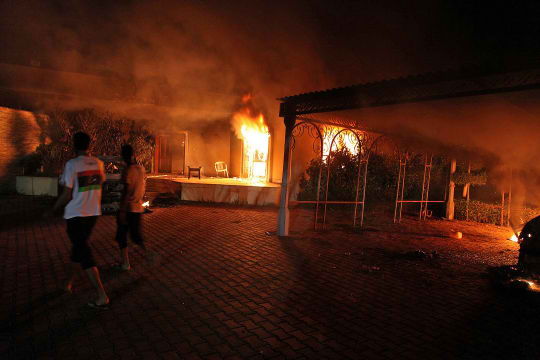By George Grant.

Tripoli, 19 December:
The US State Department has been sharply criticised for the way it handled its operation in Libya prior to the fatal consulate attack in Benghazi that led to the death of four Americans, including US Ambassador Christopher Stevens.
In an independent report made public on Tuesday evening, investigators say they found “systematic failures and leadership and management deficiencies” within two bureaus of the State Department, resulting in a “security posture that was inadequate for Benghazi and grossly inadequate to deal with the attack that took place.”
Amongst the report’s specific criticisms were an over-reliance on inexperienced local guards, including armed members of the 17 February Brigade and unarmed Libyan personnel employed by the British security firm Blue Mountain Libya (BML).
“Although the February 17 militia had proven effective in responding to improvised explosive device (IED) attacks on the Special Mission in April and June 2012, there were some troubling indicators of its reliability in the months and weeks preceding the September attacks”, the report said.
“At the time of Ambassador Stevens’ visit, February 17 militia members had stopped accompanying Special Mission vehicle movements in protest over salary and working hours…
“The Board found the responses by both the BML guards and February 17 to be inadequate. The Board’s inquiry found little evidence that the armed February 17 guards offered any meaningful defense of the SMC, or succeeded in summoning a February 17 militia presence to assist expeditiously.”
The report also criticised what it called “the short-term, transitory nature of Special Mission Benghazi’s staffing”, which resulted in “diminished institutional knowledge, continuity, and mission capacity.”
Also contributing to the lack of preparedness for the attack was an overreliance on specific warnings of imminent attacks by American intelligence officials – which they did not have in the case of Benghazi – rather than basing assessments more broadly on a deteriorating security environment.
“Terrorist networks are difficult to monitor” the report continues, “and the Board emphasizes the conclusion of previous accountability review boards that vulnerable missions cannot rely on receiving specific warning intelligence. Similarly, the lack of specific threat intelligence does not imply a lessening of probability of a terrorist attack.”
A lack of institutional knowledge and a failure to appreciate the bigger picture also led officials to rely too heavily on the judgements of Ambassador Stevens himself, the report said, with “his status as the leading U.S. government advocate on Libya policy, and his expertise on Benghazi in particular, [causing] Washington to give unusual deference to his judgments.”
Though Stevens was making his first visit to Benghazi in 10 months, his plans for taking only two American security agents “were not shared thoroughly with the embassy’s country team, who were not fully aware of the planned movements off the compound,” the report determined.
The fallout from the 11 September consulate attack generated lasting repercussions in both Benghazi and Washington.
It was the catalyst for the Save Benghazi Friday march on 21 September which saw more than 30,000 people demanding an end to militia rule in the city. The compounds of several leading Islamist militias were subsequently stormed, including that of Ansar Al-Sharia, Rafallah Al-Sahati and the 17 February Brigade.
Although neither of the two regular army colonels subsequently placed in charge of Rafallah Al-Sahati or the 17 February Brigade had any meaningful impact in practice, the attacks did lead to the deposition of Fawzi Bukatef, hitherto one of the most powerful Islamists in Benghazi who led the 17 February brigade and exercised considerable influence over Rafallah Al-Sahati and other groups.
Meanwhile Ansar Al-Sharia, the group primarily accused of responsibility for the attacks, was officially disbanded and forced to go to ground, although its presence in Benghazi still remains.
In Washington, meanwhile, the Obama administration’s initially confused response to the attacks formed one of the centerpieces of the recent presidential campaign, whilst US Ambassador Susan Rice’s opening testimony on the matter may have been what killed her chances to replace Hillary Clinton as Secretary of State.
“Based on the best information we have to date, what our assessment is as of the present is in fact what began spontaneously in Benghazi as a reaction to what had transpired some hours earlier in Cairo where, of course, as you know, there was a violent protest outside of our embassy – sparked by this hateful video”, Rice said on 16 September, in reference to the anti-Muslim film Innocence of Muslims, which denigrates the Prophet Mohammed.
In fact, as National Congress President Mohamed Magarief and others quickly asserted, the assault was almost certainly a pre-meditated terrorist attack, and one for which no individual has yet been brought to justice.
The panel, called an accountability review board, is led by Thomas Pickering, a retired diplomat. Its four other members include Mike Mullen, the retired admiral who was chairman of the Joint Chiefs of Staff, and is authorised by a 1986 law intended to strengthen security at United States diplomatic missions. [/restrict]







